
Artificial Intelligence in Agriculture
Scope & Guideline
Navigating the Future of Agriculture with Artificial Intelligence
Introduction
Aims and Scopes
- Precision Agriculture and Crop Management:
Explores the use of AI to optimize crop yields and resource use, including precision irrigation, nutrient management, and pest control. - Computer Vision and Image Processing:
Utilizes advanced imaging techniques and algorithms for tasks such as crop monitoring, disease detection, and quality assessment. - Machine Learning Applications:
Focuses on developing and applying machine learning algorithms for predictive analytics, classification tasks, and automation in agriculture. - Remote Sensing and UAV Technologies:
Investigates the role of drones and satellite imagery in monitoring agricultural landscapes and improving decision-making processes. - Sustainable Farming Practices:
Promotes the integration of AI technologies to support environmentally friendly practices and enhance food security.
Trending and Emerging
- Deep Learning Innovations:
There is a significant increase in research utilizing deep learning frameworks for various applications, including disease detection, crop classification, and yield prediction. - Integration of IoT and AI:
The convergence of Internet of Things (IoT) technologies with AI is trending, focusing on real-time monitoring and data-driven decision-making in agricultural contexts. - Automated and Smart Agriculture Solutions:
Emerging research is heavily focused on automation technologies, including robotic systems and AI-driven machinery for tasks ranging from planting to harvesting. - Data-Driven Decision-Making:
A growing emphasis on utilizing big data analytics and machine learning to inform strategic decisions in crop management and agricultural sustainability. - Environmental and Climate Resilience:
Research is increasingly focused on using AI to develop strategies for climate-resilient agriculture, addressing issues such as drought prediction and resource management.
Declining or Waning
- Traditional Agricultural Techniques:
Research focusing on conventional farming methods has decreased, as the emphasis shifts towards technology-driven solutions and smart agriculture. - Basic Data Collection Methods:
Studies that primarily discuss manual or rudimentary data collection methods are becoming less common as more sophisticated, automated approaches gain traction. - General Agricultural Reviews:
Broad reviews of agricultural practices without a specific technological focus have seen a decline, as more niche and technology-specific studies are favored. - Non-AI-Based Solutions:
Research that does not incorporate AI or machine learning methodologies is becoming less frequent, as the journal emphasizes innovative technological applications.
Similar Journals
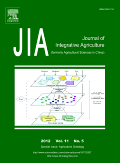
Journal of Integrative Agriculture
Pioneering Integrative Solutions for Global AgricultureJournal of Integrative Agriculture, published by Elsevier Science Ltd, stands as a leading platform for innovative research at the intersection of agricultural sciences. With a significant focus on integrative approaches, this journal has established itself within the academic community, reflecting its excellence through impressive Impact Factor rankings and a consistent Q1 category status in multiple fields, including Agronomy, Animal Science, and Ecology. The journal spans a wide range of topics, making it a critical resource for exploring advancements in Biochemistry, Food Science, and Plant Science. With its diverse Scopus rankings—from Rank #3 in Food Animals to Rank #14 in Animal Science—it serves as a vital repository for cutting-edge research that influences both scientific inquiry and practical applications in the agricultural domain. Operating from China and accessible through open access options, the Journal of Integrative Agriculture aims to foster collaborative research and knowledge exchange among scientists, professionals, and students worldwide, supporting the growth and sustainability of agricultural practices.

Journal of Agricultural Sciences-Tarim Bilimleri Dergisi
Connecting Scholars to Transform Agricultural PracticesJournal of Agricultural Sciences - Tarim Bilimleri Dergisi, published by Ankara University, Faculty of Agriculture, is a prominent open-access journal that has been fostering academic dialogue in the field of agricultural studies since 2010. With ISSN 1300-7580 and E-ISSN 2148-9297, this journal contributes significantly to the scientific community, particularly within the realms of agronomy, crop science, animal science, and plant science. As of 2023, it holds a Q3 classification in Agronomy and Crop Science, and Q4 in both Animal Science and Zoology and Plant Science, indicating its growing influence and dedication to advancing research in these areas. Situated in Turkey, this journal serves as a vital platform for scholars, professionals, and students, inviting submissions that enhance our understanding of agricultural innovation and sustainability. With a commitment to disseminating high-quality research, Journal of Agricultural Sciences ranks favorably within Scopus, providing an invaluable resource for exploring evolving agricultural paradigms.
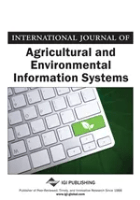
International Journal of Agricultural and Environmental Information Systems
Fostering Collaboration for Environmental StewardshipInternational Journal of Agricultural and Environmental Information Systems, published by IGI Global, is a leading platform for scholarly discourse bridging the domains of agriculture, environmental science, and information systems. With its ISSN 1947-3192 and E-ISSN 1947-3206, this esteemed journal has been pivotal in tackling key information challenges within these crucial fields since its inception in 2010, and it continues to evolve until 2024. Featuring articles ranked in the Q3 category for Information Systems based on Scopus metrics— where it proudly stands at Rank #105 out of 394—this journal occupies a significant position in advancing knowledge dissemination and applied research. The open access option broadens the reach of its valuable content, making it accessible to a diverse audience. The journal's objective is to foster interdisciplinary research and innovations that enhance sustainability in agricultural practices and environmental management. By subscribing to the latest studies and innovations, researchers, professionals, and students can leverage the insights published in the International Journal of Agricultural and Environmental Information Systems to significantly contribute to their fields and foster better decision-making in environmental stewardship and agricultural advancements.
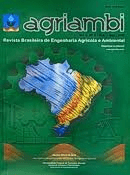
Revista Brasileira de Engenharia Agricola e Ambiental
Fostering Excellence in Agricultural and Environmental ResearchRevista Brasileira de Engenharia Agricola e Ambiental, published by the Universidade Federal de Campina Grande, serves as a pivotal platform for researchers and professionals in the fields of agricultural and biological sciences, agronomy, and environmental engineering. With an open-access policy since 2000, this journal aims to foster global dissemination of innovative research and practices, ensuring that high-quality findings are accessible to all. Operating in Brazil, it holds notable rankings, including Q2 in the categories of Agricultural and Biological Sciences (miscellaneous) and Agronomy and Crop Science, indicating its strong academic impact and influence within these fields. As of 2023, it ranks #68 out of 193 in Agricultural and Biological Sciences and #188 out of 406 in Agronomy and Crop Science, representing its commitment to advancing scientific knowledge. The journal primarily focuses on publishing studies that address challenges in agricultural engineering and environmental sustainability, making it an essential read for students, researchers, and professionals who are dedicated to innovation and excellence in these dynamic fields.
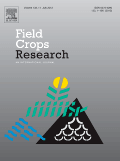
FIELD CROPS RESEARCH
Transforming Agricultural Practices with Groundbreaking StudiesFIELD CROPS RESEARCH is a premier academic journal published by Elsevier, dedicated to advancing knowledge in the fields of Agronomy and Crop Science as well as Soil Science. Now in its 46th year of publication, this esteemed journal has established itself as a leading resource, holding a prestigious Q1 ranking in both the Agronomy and Soil Science categories, with a remarkable blend of rigorous peer-reviewed research and innovative findings. With a Scopus ranking of #27/406 in Agronomy and #20/159 in Soil Science, and a notable 93rd and 87th percentile respectively, FIELD CROPS RESEARCH plays a vital role in informing practices that drive sustainable agriculture and optimize crop production. Although not an open access journal, it remains highly accessible to the global research community and offers critical insights that influence policy and agricultural practices worldwide. Researchers, professionals, and students are encouraged to delve into this journal, as it continues to shape the future of field crop research through impactful studies and comprehensive reviews.

Agricultural & Environmental Letters
Cultivating insights for sustainable agricultural practices.Agricultural & Environmental Letters, published by WILEY, is an esteemed open-access journal dedicated to advancing knowledge in the fields of agronomy, environmental science, and soil science. Since its inception in 2016, the journal has provided a vital platform for researchers, professionals, and students to contribute to critical discussions on sustainable agricultural practices and environmental management. With an impressive 2023 impact factor placed in the Q2 category across various fields—namely Agronomy and Crop Science, Management, Monitoring, Policy and Law, and Soil Science—this journal occupies a significant position in academic discourse. The journal’s Scopus rankings further attest to its influential role; it ranks in the top half of its categories, reflecting the quality and relevance of the research published within. Agricultural & Environmental Letters welcomes innovative research articles, reviews, and empirical studies focusing on pressing environmental and agricultural issues, ensuring accessibility for a global audience committed to sustainability in agriculture and environmental stewardship.

APPLIED ENGINEERING IN AGRICULTURE
Empowering Agricultural Progress with Applied Engineering Insights.APPLIED ENGINEERING IN AGRICULTURE is a peer-reviewed journal published by the American Society of Agricultural and Biological Engineers, dedicated to advancing the field of agricultural engineering through the dissemination of high-quality research. With an ISSN of 0883-8542 and an e-ISSN of 1943-7838, this journal has been a key resource since its inception in 1985, serving as a vital platform for scholars and practitioners to share innovative ideas and practical solutions that enhance productivity and sustainability in agricultural practices. The journal is ranked in the Q3 category for Engineering (miscellaneous) as of 2023, and is positioned within the 43rd percentile of the general engineering rankings in Scopus. While not currently an open-access journal, APPLIED ENGINEERING IN AGRICULTURE remains crucial for researchers and professionals looking to explore diverse engineering solutions that address the complexities of modern agriculture, making it an invaluable resource for anyone committed to improving agricultural systems through engineering advancements.
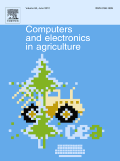
COMPUTERS AND ELECTRONICS IN AGRICULTURE
Empowering Crop Science with ElectronicsCOMPUTERS AND ELECTRONICS IN AGRICULTURE, published by Elsevier Science Ltd, is a premier interdisciplinary journal dedicated to the exploration and application of computing and electronic technologies within agricultural sciences. With an impressive impact factor reflected in its Q1 status across multiple categories, including Agronomy and Crop Science, Animal Science and Zoology, and Computer Science Applications, this journal stands out as a leading platform for advancing research in these critical fields. The journal's aims include fostering innovation and facilitating knowledge transfer between academia and industry by disseminating high-quality research that addresses the challenges of modern agriculture through technological solutions. For researchers, professionals, and students dedicated to enhancing agricultural productivity and sustainability, COMPUTERS AND ELECTRONICS IN AGRICULTURE serves as an essential resource, offering insights that push the boundaries of traditional practices while embracing the digital future of agriculture.

TROPICAL AGRICULTURE
Cultivating knowledge for sustainable development in agriculture.Tropical Agriculture is a reputable journal dedicated to advancing knowledge and research in the fields of Agronomy and Development, with a particular emphasis on tropical farming practices and agricultural innovation. Published by the University of the West Indies, this journal serves as a crucial resource for researchers, professionals, and students engaged in the complexities of agriculture in the tropics. Established in 1979, it has witnessed significant contributions and continues to facilitate scholarly discussions through its quarterly publications. While the journal currently holds a Q4 ranking in both the Agronomy and Development categories, its commitment to fostering research excellence positions it as a pivotal platform for emerging studies and regional agricultural advancements. Although not an open-access publication, it provides critical insights and localized research that greatly benefit the agricultural community, particularly within the Caribbean context. Researchers and professionals in the field can rely on this journal for insightful content on tropical agricultural challenges and developments, enhancing knowledge dissemination and application across related disciplines.

AgriEngineering
Connecting Researchers to Revolutionize Food ScienceAgriEngineering is a premier Open Access journal, published by MDPI, focusing on innovative research across the disciplines of agronomy, horticulture, food science, and engineering. Established in 2019 and headquartered in Basel, Switzerland, this journal has rapidly gained recognition, evidenced by its robust performance in the Scopus rankings and its positioning in Q1 and Q2 quartiles of key categories, including Horticulture and Agronomy. With a commitment to disseminating high-quality research that advances agricultural engineering practices, AgriEngineering provides a platform for researchers, professionals, and students to explore cutting-edge developments aimed at enhancing food production systems and sustainability. Its Open Access model ensures wide-reaching accessibility to vital research outcomes, empowering global collaboration and innovation in the field. For more information on submission and access, you can visit the AgriEngineering website.